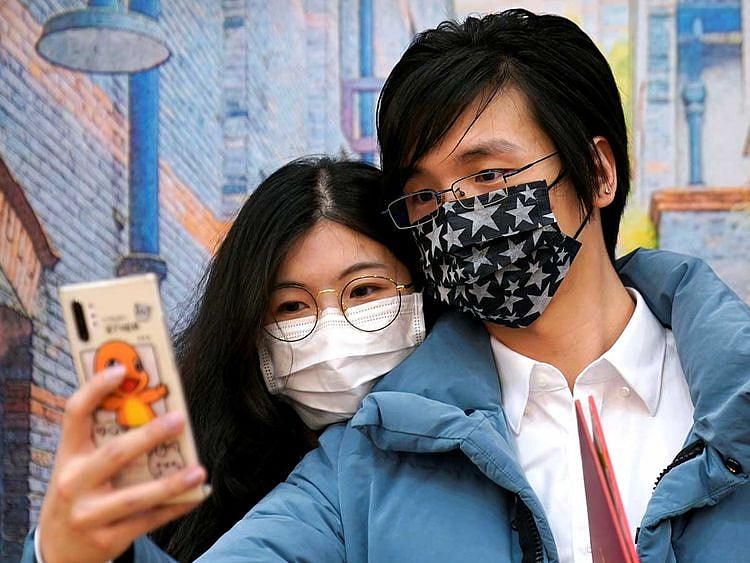Perhaps a week ago, I wandered downstairs, laptop in hand, to show my husband an extremely dire Twitter thread from an Italian doctor. It had been translated into English and was rapidly going viral. He took one look, gave me an exfoliating stare and handed the computer back to me. The thread was 20 parts long.
"Why," he asked, "are you showing me this?"
It wasn't because he'd been in denial all week, sticking his fingers in his ears. It was because this man - who's had more chaos in his life than I have, and who's contended with far more loss - was calmer in the face of adversity than I was. Yet I was starting to wear even him out, and I hadn't realized it.
The coronavirus may turn out to be the ultimate stress test for couples. There's some literature we can rely on as a guide. In 2002, for instance, The Journal of Family Psychology published an extraordinary paper that looked at couples in the aftermath of a 1989 storm, Hurricane Hugo, comparing those who'd lived in the afflicted counties in South Carolina to those who hadn't.
The results? More people in the counties the storm hit divorced the following year. But more people also married. And there was an increase in births. The hurricane spurred a great deal of emotional movement, in all directions.
We are now reckoning with a crisis of a potentially much larger magnitude. The coronavirus pandemic forces all of us to contend not just with the customary tensions of a disaster, which are financial and logistical, but also with a sense of dread as well.
To live through it means tolerating a painful uncertainty - particularly in these early days, as we're all still waiting to see just how many cases there are, how overwhelmed the hospitals will become and how bad the economic devastation will be.
Partners, even those in long-term relationships, have very different coping styles when it comes to uncertainty. I called Esther Perel, the noted therapist and host of the podcast "Where Should We Begin." She described several styles that might be relevant right now. Among them:
We all fall onto a spectrum when it comes to these attitudes and behaviors, obviously. But if I were to generalize, I'd say that I lean into crises, in ways both good and bad. They keep me up with worry, but they also energize me. I fret out loud, but then I write about it.
My husband, a far bigger information sponge than I am, is more measured. He knows when to stop reading headlines, go make dinner and fix himself a drink. (Actually, on the cocktail front, we're pretty similarly aligned. So that's good.) He's not wearing his stress. He's a thermos bottle - you can't discern the temperature of the contents inside - whereas I'm more of a mood ring.
This dynamic is a familiar one in our relationship. When Donald Trump was elected, my husband and I had a running argument.
Me: "You are underreacting."
Him: "No, I'm not. You are overreacting."
So now, here we are again, with each of us assuming our familiar positions on the tennis court. I asked Perel what she made of it. Her reply was one of the wisest I'm sure to hear in this time of upheaval.
"If you polarize and you think that there's only one way to do things," she said, "it's fake certainty. The whole point is that you're discovering it along the way."
Which means that when couples clash over strategies and coping styles, it's important to remember that both parties - within reason, of course - are right. Or potentially right. Each person deserves a hearing. There's really no way to know.
This one drop of insight, to me, was everything - akin to the moment in high school chemistry class when you're titrating a solution and the stuff in the beaker goes from pink to clear.
In most times of crisis, we can turn to others for succor and comfort. In this particular crisis, we're strongly encouraged - if not forced - to self-isolate. That puts an enormous burden on our partners. Even under the best of circumstances, we can tire them out with a familiar soundtrack of stories, observations, and anxieties.
To keep our relationships sane, we'll all need to turn to virtual communities of outsiders, whether it's through work or FaceTime or virtual dinner parties (Perel and her husband, the clinical psychologist Jack Saul, are planning to attend one this week).
And we should remember, too, that differences are helpful. Contending with this crisis is going to require a wide variety of strengths.
Sign up for the Daily Briefing
Get the latest news and updates straight to your inbox
Network Links
GN StoreDownload our app
© Al Nisr Publishing LLC 2026. All rights reserved.
